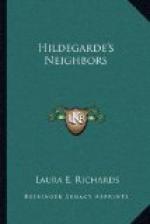Roger, less imaginative, and more skilled in wood-lore, saw a great blue heron, sitting huddled together on a stump, its head drawn in, its yellow eyes glaring wild with fright.
“It must be wounded!” he said softly. “Keep very still, and I will see if we can come nearer.”
Softly, slowly, the birch canoe stole through the water. It scarcely seemed to move, yet every moment brought them nearer to the wild creature of the woods. It made no attempt to fly, only crouched lower, and tried to flatten itself against the stump.
“Oh, poor, poor thing!” whispered Hilda. “Can you do anything for it, Captain Roger?”
“Only one thing, I fear,” said Roger, gently. “Its leg is broken, and we must not leave it in misery.”
“You must kill it? Oh, it seems too pitiful! No, I am not going to be silly, only I will turn my head away, please, Captain Roger.”
Now she could have put her hand on the wounded bird, as it sat motionless, only the wide eyes of terror telling that it was alive. The bow of the boat passed close against the log, and on beyond. Hilda thought she should never forget the dumb agony of those eyes. They should not be here at all, she thought. It was not decent for human beings to thrust themselves into the sorrows and mysteries of the woods and water. She could not—
Roger leaned forward, paddle in hand; a moment, and all was over. Something slid into the water, and there was a little plashing murmur among the reeds; then stillness again.
The canoe began to move backward, and Hilda opened her eyes, which had been tightly closed. Neither of the two spoke until they were in open water again, and the swamp left behind.
“I am sorry!” said Roger then, almost apologetically. “I am sorry that happened. The poor creature had been shot, and was badly wounded; it would only have lingered in pain.”
“Oh yes, I know; I am so glad you were there, to help it out of the suffering.”
“But now you will never want to come here again, I fear.”
“Oh, but I shall!” cried Hilda. “I am not so silly as that, truly I am not. I shall always think of this as the loveliest place I know; and—”
“Well, and—what?” asked Roger.
“Oh, nothing! Only—well, it is your own place,” said Hilda frankly, “and I shall always think of you here, in the dear Cheemaun, with the enchanted princesses—I mean the sandpipers— and the fish-hawk, and all the rest of it.”
“If it is mine, I may do what I like with it, and I give it to you. Will you have it?”
“Oh, we will share it together!” cried Hilda eagerly; and then bethought herself, and blushed in her usual ridiculous way, and wondered if the back of her neck were blushing too. It was, and Roger saw the crimson mounting to the pretty ears and losing itself in the fair hair; and he wondered—and wondered again, and then remembered that people sometimes blushed when they were angry. He was a very, very stupid Roger, in some ways; but in a moment Hilda began to talk as cheerfully as possible, and to ask about all the birds they had seen, so Roger was relieved, and they paddled home to breakfast in a very pleasant way.




